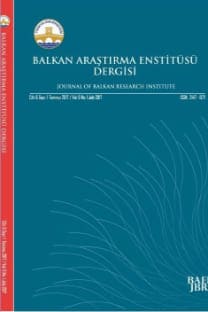Yugoslavya Krallığı Siyasal Yaşamında Hırvat Sorunu (1929-1941)
Bu makalede 1 Aralık 1918’de kurulan Sırp-Hırvat-Sloven Krallığı’nda Kral Aleksander Karađorđević’in 6 Ocak 1929’da diktatörlüğünü ilan etmesinden ve devletin adını Yugoslavya Krallığı olarak değiştirmesinden sonra ülkede yaşanan Hırvat sorunununsiyasi yapısı ve bu sorunun çözülebilmesi yönünde atılan adımlar incelenecektir. Sırp-Hırvat-Sloven Krallığı’nın kuruluşundan itibaren devletin federalizm çerçevesinde örgütlenmesini isteyen Hırvatların bu yöndeki talepleri merkeziyetçi bir devlet yapısını savunan Sırplar tarafından engellenmiştir. Büyük Sırbistan’ın kurulması yönünde siyasi bir programı savunan Kral Aleksander Hırvatların taleplerini görmezden gelerek ülkedeki siyasal yaşamı kontrol altına almaya çalışmıştır. Ancak Hırvatların, Sırpların denetimindeki merkeziyetçi devlet yapısına yönelik itirazları şiddetlenmiş ve devletin federalleştirilmesine yönelik izledikleri adımlar artmıştır. Hırvatlar hem Yugoslavya içi hem de dönemin Avrupası’ndaki siyasi dengeleri gözeterek devleti de facto olarak 1939 yılında Sırplarla yaptıkları bir antlaşma sonucunda (kon)federalleştirmişlerdir. Makalede Hırvat siyasi talepleri bağlamında Yugoslavya Krallığı’nın federalleştirilmesi süreci incelenmiş ve bu sürecin gerçekleşmesinde etkili olan ülke içi ve dışı siyasi dinamiklere değinilmiştir
CROATIAN QUESTION IN THE POLITICAL LIFE OF KINGDOM OF YUGOSLAVIA (1929-1941)
The political tension of the “Croatian Question” in the Kingdom of Yugoslavia was increased after the declaration of dictatorship on 3 October 1929 by King Aleksander Karađorđević. The demands of Croats were that to organize the state within the framework of federalism since the establishment of the Kingdom of Serbs, Croats and Sloveneson 1st December 1918 have been hampered by the Serbs who were advocating a centralized state structure. Defending a political program for the formation of Great Serbia, King Aleksander tried to control the political life in the country by ignoring the demands of the Croats. However, the objections of the Croats to the centralized state structure under the control of the Serbs have intensified and the steps taken by the government towards federalization have increased. The Croats federated the state de facto in 1939 as a result of a treaty with the Serbs, taking into account the political balances both within Yugoslavia and Europe during that period. In the context of Croatian demands, the process of (con)federalization of the Kingdom of Yugoslavia was examined and the internal and external political dynamics that were influential in the process were addressed
